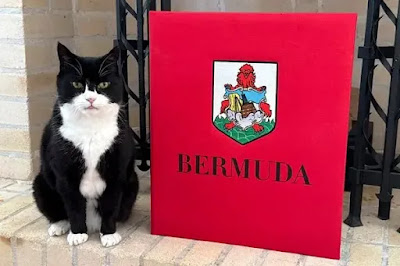In a delightful twist of diplomatic history, Palmerston, the beloved black-and-white cat who has long patrolled the hallowed halls of the UK Foreign Office, is packing his bags (or rather, his favourite blanket and a few toys) for a sun-soaked new chapter in Bermuda. The announcement of his official role in the British Overseas Territory has sparked joy among cat lovers and diplomats alike, proving once again that Palmerston’s charm knows no borders. Let’s raise a paw to celebrate this feline’s latest adventure!
From Downing Street to Paradise: Palmerston’s Journey
Palmerston, named after the 19th-century British Prime Minister Lord Palmerston, has been a fixture at the Foreign, Commonwealth & Development Office (FCDO) since 2016. Officially titled the Chief Mouser, he earned his keep by keeping the office free of rodents while winning hearts with his dapper bow tie and playful antics. But after years of navigating the corridors of power, Palmerston is ready for a change of scenery—and who can blame him? Trading London’s grey skies for Bermuda’s turquoise waters sounds like a dream come true.
The move comes as part of a light-hearted initiative to strengthen ties between the UK and its Overseas Territories, with Palmerston appointed as Bermuda’s "Ambassador of Goodwill." While the role is largely ceremonial, it underscores the island’s warm relationship with the UK and adds a touch of whimsy to international diplomacy. Palmerston’s new duties will include greeting visitors at Government House, posing for photos with tourists, and, of course, napping in the island’s lush gardens.
A Purr-fect Fit for Bermuda
Bermuda, with its balmy climate and laid-back vibe, seems tailor-made for Palmerston’s retirement from the high-stakes world of Westminster. The island’s Governor, Rena Lalgie, welcomed the news with enthusiasm, noting that Palmerston’s presence will bring a smile to residents and visitors alike. "We’re thrilled to have Palmerston join us," she said. "He’s already a celebrity in the UK, and we can’t wait to see him basking in the Bermudian sunshine."
Local officials have gone all out to ensure Palmerston feels at home. A custom-built cat house, complete with a shady veranda and ocean views, has been installed at Government House. The island’s chefs are reportedly experimenting with fish-based treats to cater to his refined palate, and a team of volunteers has been assembled to keep him entertained with toys and belly rubs. It’s clear that Bermuda is rolling out the red carpet—or rather, the scratching post—for its newest resident.
Palmerston’s Legacy: A Feline Diplomat Like No Other
Palmerston’s tenure at the Foreign Office was nothing short of legendary. From his playful rivalry with Larry, the Downing Street cat, to his knack for photobombing official meetings, he became a social media sensation, amassing thousands of followers on X (formerly Twitter). His antics provided a welcome dose of levity during tense diplomatic moments, reminding us all that even in the world of high politics, there’s room for a little fun.
But Palmerston’s move to Bermuda isn’t just a retirement—it’s a continuation of his diplomatic mission. In an era of global challenges, his presence serves as a reminder of the power of soft diplomacy. After all, who better to bridge cultural divides than a cat who’s equally comfortable in the halls of power and the laps of strangers? As one Foreign Office staffer put it, "Palmerston has always been a uniter, not a divider. Bermuda is lucky to have him."
A Bright Future in the Tropics
As Palmerston prepares to board his flight (in a custom carrier, naturally), the UK and Bermuda are abuzz with excitement. Social media is flooded with well-wishes, and fans have already started planning visits to catch a glimpse of the famous feline in his new tropical home. For Palmerston, the move promises a life of sunshine, sea breezes, and endless treats—a far cry from the rainy days of London.
So here’s to Palmerston, the Foreign Office cat turned Bermudian icon. May his days be filled with lazy naps, playful chases, and the occasional diplomatic purr. As he settles into his new role, one thing is certain: this feline diplomat will continue to spread joy, one sunbeam at a time. Bon voyage, Palmerston—and thank you for reminding us that even in the most serious of times, there’s always room for a little cat magic.



.jpg)